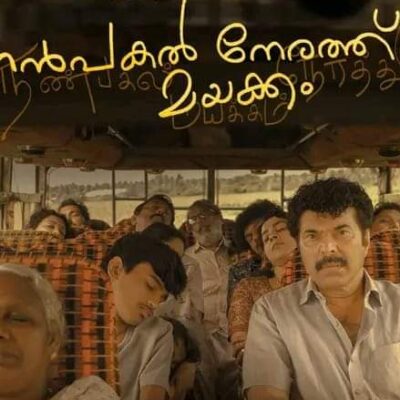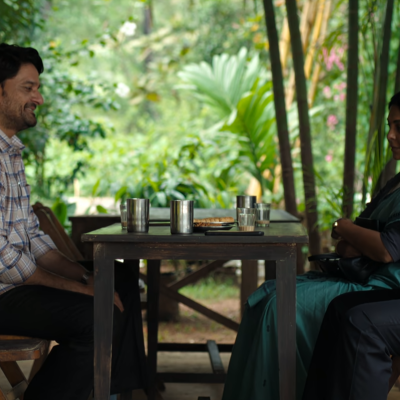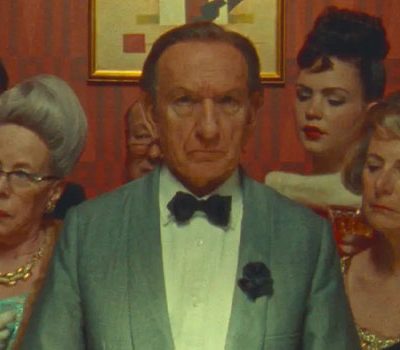Just like in the film Jallikattu, there were certain segments that I really liked and wanted to dig deep.
Fair warning/PS/Kindly note: These all are my exaggerated assumptions, so just take it with a slight pinch of imagination and “Kuch Bhi Ho Sakta Hai” scenario. Danke!
- In the beginning the character James mentions that he is neither an atheist nor a devout. But with the incidents that unfolded after that was His way of showing that He exists and with such an out-of-the-body experience, He wanted to make His presence felt just like how He turned water into wine.
- There’s a large tree that has benches underneath it, near the fields. The moment James had crossed that he became Sundaram and almost immediately the songs and dialogues from old Tamil movies started to play. Again until he (and his family/friends) reach the tree on their way back, we could hear the songs playing. As soon as he reaches that spot, it just stops – kind of indicating that he is fully James again from Sundaram.
- Initially when Sundaram (James) enters his supposed house casually, changes his clothes, and tells her wife, “No need to wake up, I’ll make myself some coffee”, when she was seen lying down, she goes in shock. She doesn’t know how to react or what to react. She acted as if he was a stranger but not a complete one. Hers and Sundaram father’s movements seemed as if they could recognize him even though he is not his family. And just after he goes out on “his” moped, Sundaram’s wife opens an almirah, takes her husband’s photo and cries. And few other instances made me believe that even though this newly entered Sundaram is not the actual Sundaram, he was more or less like that as per the looks.
- But as the film progressed, I started to question my previous assumption (3). There were two major factors contributing to it. One, the neighbour/friend enters Sundaram’s house and questions, “Eyy! Yaar pa nee?!?!” (Hey! Who are you man?!?!). He didn’t flinch or get astonished seeing the new Sundaram. If we encounter a familiar face after much time, our initial reaction would always be shock and confusion. Two. All the members of the Sundaram family were brown/black. Even his kid was on the darker side while her mother (Sundaram’s wife) was wheatish. Since the daughter’s skin was dark, she would’ve surely inherited it from her father, thereby his being dark is the only plausible explanation. But the new Sundaram here was light-skinned. So, I quashed my assumption #3.
- The way the new Sundaram was reciting the dialogues from the Tamil film Gauravam made me wonder if the paths of Sundaram and James had ever crossed previously, even unintentionally. Because James was anti-Tamil and didn’t recognize Tamil culture/food/language/even songs, for that matter. But when he becomes Sundaram, he not only becomes a Tamilian but fully enjoys being one. The only “scientific” reason I had while watching was some crazy, mad scientist-level blood transfusion or some transfusion which made James think and be as Sundaram as he woke up from his nap.
- Speaking of recitation, the dialogue which Sundaram re-enacted was a scene which was an argument between uncle and nephew, both played by Sivaji Ganeshan. The film Garuvam was an adaptation of a play called “Kannan Vanthaan”. It (the play and the film) was written by, any guesses? Vietnam Veedu Sundaram. Crazy coincidence no! With the names, or was it though?
- There were two major turning points in the film, IMO. One is the construction of the temple and two, the news of Mayilsaami’s death who is Sundaram’s barber. He already was so worked up with the “sudden” appearance of the temple construction which was not there the previous day (according to him). When he got to know that Mayilsaami passed away six months back, he couldn’t comprehend what was going on. And then, just then, he saw his face in the mirror and he got the shock of his life. He barely recognizes himself. Let me rephrase that – he doesn’t understand why he could see some other face reflection instead of his. That moment was the point of no return in the movie and that scene solidified my assumption #4.
- If you observe the entire village, including the Malayali outsiders, were grief-stricken. Except for Sundaram’s mother and Sundaram (James) of course. The main reason, I felt, was the village and its people had some void after Sundaram’s (real) disappearance. But slowly, they filled that void with some other elements. Sundaram’s daughter filled it with her Chithappa (Sundaram’s brother), some of the villagers with a new milkman, his drinking buddies with new glassmates, and his wife with emptiness. Everyone had filled the void and moved on. So, his sudden appearance (or supposedly so), sent shock waves across and they just couldn’t digest AND accept him as one of their own. But her mother accepted him as her son almost immediately and also mentioned him to others as one of her own. So, only his mother and he were nonchalant and at their usual self.
- Another reason for the village to be in grief is that this so-called Sundaram is not actually him and it’s just a matter of time before he’d go to his own world with his family to his habitat. And once he did, the people of the village will once again lose Sundaram. Losing a person is hard enough to mourn. Losing ‘again’ would lead to endless bereavement, something nobody in the village was willing to bet upon.
- When Sundaram becomes James again, they all start going back to their bus where it first halted. On their way back, the songs, and monologues of various old Tamil films play in the background – summarising the psychological state of James/Sundaram and his people (both Malayalis and Tamilians). As soon as he crosses a big neem tree, which acts as a shelter, the songs just stop. It suggested that the protagonist is completely James now and no part of Sundaram is left/remains. He is no more a beedi-smoking, loan-seeking, milkman Sundaram. He is the miser, grumpy, anti-Tamil James that we saw him at the beginning.
- Finally! And finally, all this dramatic episode of James becoming Sundaram, lurking around the village as his own, selling milk, smoking a beedi, drinking cheap liquor and re-enacting as Sivaji Ganesan – is all nothing but a dream!
Because the scene where he tells the driver to halt the bus and the scene of James staring at the cornfields seemed in continuum. Not only that, earlier his relative (and his wife) had ditched the group and scooted when a commuting jeep passed by. But in the final scene of the stare, the same relative was there at his behind sleeping. And so was everybody. No person would sleep after such a weird day, no matter how tired they are. So, this didn’t add up with the previous scene of them walking back towards the bus.
So, after all, it was just a “Nanpakal Nerathu Mayakkam” – one lazy afternoon dream!
Special Mention: The writing on the bus showed “Sarathy Theatres” on the front and on the back, “Sarathy Theatres presents “Oridathu”. Written and directed by Thilakan”
This was the same Thilakan where the bus driver assured that he had spoken with the bus owner that there would be a bit of delay in the arrival and he was okay with it.
Lijo’s father, Jose Pellissery was a partner at Sarathy Theatres. And there, he acted in many plays which was directed by Thilakan. I guess that ‘Oridathu’ might be one of Thilakan’s plays where Jose performed.




